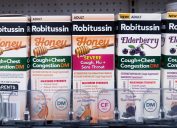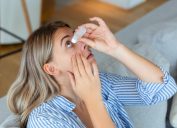FDA Says Never Take These OTC Medications Before Driving in New Alert
The agency is warning consumers about potential side effects that could impair them.

Whether it's Tylenol for a headache or melatonin to help you sleep, there are plenty of over-the-counter (OTC) medications and supplements we take regularly. But many meds carry side effects, including some we're not always aware of, which is why we're often warned to avoid operating heavy machinery. As it turns out, in some cases, even OTC medications can impair your driving.
RELATED: FDA Issues New Warning About 9 Supplements With "Toxic" Ingredient.
The U.S. Food and Drug Administration (FDA) released an alert on March 12 to inform consumers about this risk. The agency said that although most medications won't affect your ability to drive, there are some prescription and nonprescription drugs that can. These meds have potential side effects that may make driving unsafe, including sleepiness, drowsiness, blurred vision, dizziness, slowed or uncoordinated movement, fainting, inability to focus or pay attention, nausea, and excitability.
"Knowing how your medicines—or any combination of them—affect your ability to drive or operate other machinery is an important safety measure," the agency said.
Some of the common prescription medications that can make driving dangerous include opioids, antidepressants, and muscle relaxants, as well as anti-anxiety, antipsychotic, and antiseizure medicines.
But it's the OTC meds you're less likely to be worrying about. In its new alert, the FDA warned consumers that many nonprescription medicines could also make it unsafe to drive: diet pills; "stay awake" medicines; stimulants such as caffeine, ephedrine, and pseudoephedrine; medicines that treat or control symptoms of diarrhea and urine or bladder control; medicines that treat or prevent symptoms of motion sickness; sleeping pills; and some OTC cold remedies and allergy medicines that contain an antihistamine.
"Also, taking products containing cannabis or cannabis-derived compounds, including CBD, could make driving dangerous," the agency added. "CBD can cause sleepiness and changes in alertness."
RELATED: 12 Supplements You Should Never Take Together, Medical Experts Say.
The length of time in which your driving could be impaired depends on the medication. The FDA said that some might only affect you for a short time after you take them, while the effects of others could last for several hours and into the next day.
As an example, the agency cautioned that even if you take them at night, some sleep medicines can make it harder for you to drive the following morning.
"If you take sleep drugs, talk with your health care professional about ways to take the lowest effective dose, when to take the medicines before bedtime, and when it would be safe to drive again after taking a sleep medicine," the FDA advised.
The agency also specifically highlighted the potential dangers of taking certain allergy medicines before driving, noting that many consumers may not realize that this is a concern.
"Antihistamines can slow your reaction time, make it hard to focus or think clearly, and may cause mild confusion even if you don't feel drowsy," the FDA explained.
RELATED: Vitamin D Supplement Is Being Recalled—Serious Side Effects Possible, FDA Warns.
To help prevent risks, you should avoid drinking alcohol while using antihistamines and check with your doctor to see if it is OK for you to take antihistamines if you also use sleep meds.
"Those combinations can increase sleepiness or drowsiness," the FDA warned.
When it comes to OTC medications, the agency encouraged consumers to always pay attention to the warnings on the Drug Facts label. Beyond that, if it is your first time using the medicine, you should do so only when you don't need to drive, since you won't know how it will affect you.
"You can still drive safely while taking most medicines," the FDA concluded. "But talk to your health care professional about possible side effects. Your health care professional might be able to change your dose, adjust the timing of when you take the medicine, or switch the medicine to one that causes fewer side effects for you."
Best Life offers the most up-to-date information from top experts, new research, and health agencies, but our content is not meant to be a substitute for professional guidance. When it comes to the medication you're taking or any other health questions you have, always consult your healthcare provider directly.





















